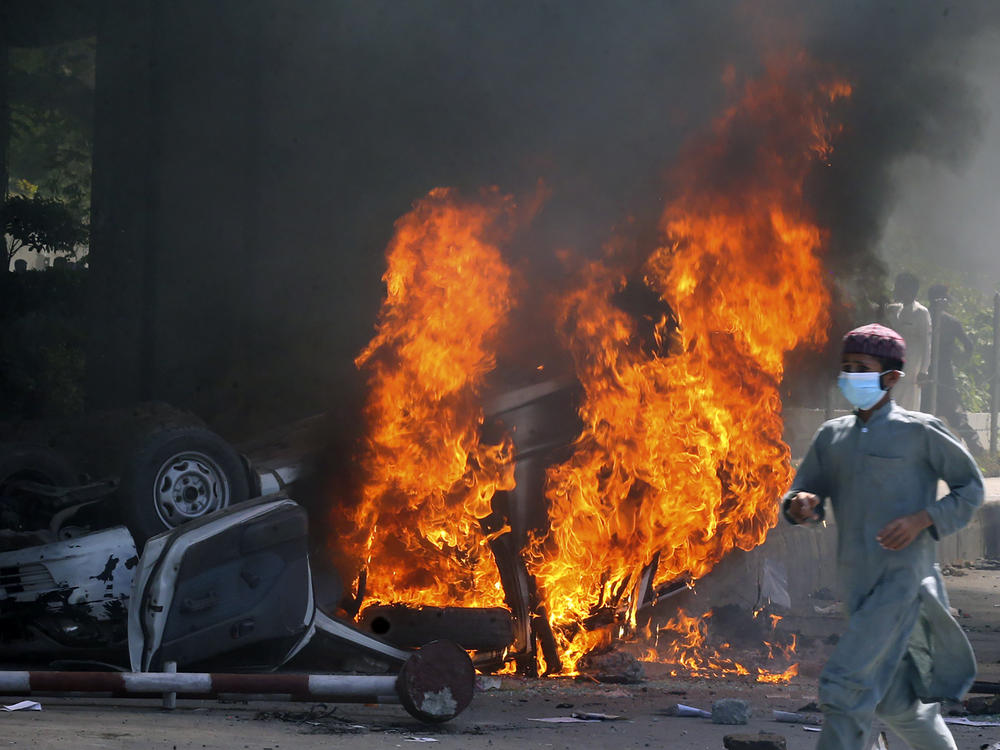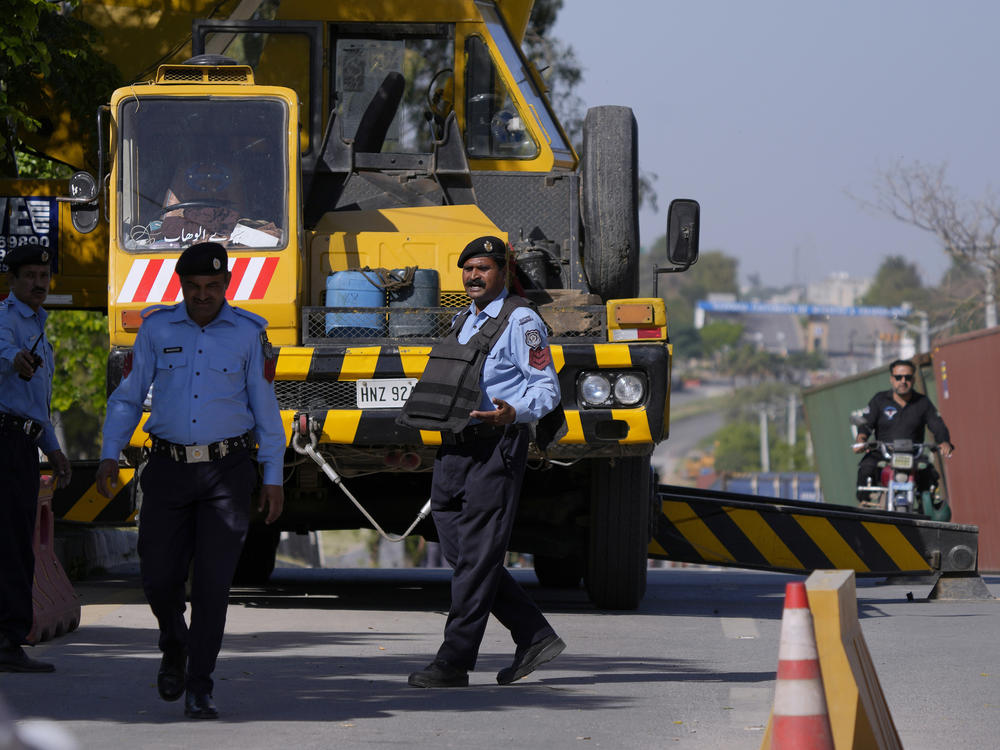Section Branding
Header Content
Pakistan turmoil deepens after Imran Khan's arrest
Primary Content
Updated May 10, 2023 at 12:58 PM ET
ISLAMABAD (AP) — Former Pakistani Prime Minister Imran Khan can be held for eight days, a court ruled Wednesday, a day after the popular opposition leader was dragged from a courtroom and arrested on corruption charges, deepening the country's political turmoil.
Khan's arrest Tuesday set off violent clashes involving his supporters and police in several cities, including Islamabad, that left at least six people dead, and his continued detention raised the prospect of more unrest.
Following a Cabinet meeting, Prime Minister Shahbaz Sharif denounced the attacks on public property and military installations, and he approved the deployment of troops in the capital of Islamabad, in the country's most populous province of Punjab, and in the volatile northwest, according to a government statement.
In the latest unrest, thousands of protesters stormed a radio station and offices of the state-run agency in the northwestern city of Peshawar.
The military weighed Wednesday with a strongly worded statement, vowing to take stern action against those seeking to push Pakistan toward a "civil war." It called the organized attacks on its installations a "black chapter" in the country's political history.
"What the eternal enemy of the country could not do for 75 years, this group, wearing a political cloak, in the lust for power, has done it," the statement said, adding that troops had exercised restraint but they will respond to further attacks, and those involved will bear the responsibility.
It said those who facilitated or planned attacks on military installations had been identified, and "strict action will be taken against them as per the law, and all these evil elements will now be responsible for the consequences."
The military did not directly name Khan, the 70-year-old politician who was ousted in a no-confidence vote last year.
His dramatic arrest on Tuesday — he was pulled out of a hearing in Islamabad's High Court on one set of charges, only to be arrested on another set — was the latest confrontation to roil Pakistan. He is the seventh former prime minister to be arrested in the country, which has also seen interventions by the powerful military over the years. The move comes at a time of economic crisis, when the cash-strapped nation is trying to avoid a default.
Khan's Islamabad appearance was on multiple graft charges brought by police. As he showed up, the courtroom was stormed by dozens of agents from the anti-corruption agency, the National Accountability Bureau, backed by paramilitary troops. They broke windows after Khan's guards refused to open the door.
The former cricket star has denounced the cases against him, which include corruption and terrorism charges, as a politically motivated plot by Sharif, his successor, to keep him from returning to power in elections to be held later this year. Khan has campaigned against Sharif and demanded early elections.
Khan's Pakistan Tehreek-e-Insaf party has appealed for calm, but the standoff put the country on high alert after Tuesday's clashes. Police were deployed in force across the country, and they placed shipping containers on a road leading to the sprawling police compound in Islamabad where Khan is being held.
Khan supporters in Peshawar raided a building housing Radio Pakistan, damaging equipment and setting fire to it, said police official Naeem Khan. Some employees were trapped inside, he said, and police were trying to restore order.
In eastern Punjab province, the local government asked the army to step in after authorities said 157 police were injured in clashes with protesters.
Police have arrested 945 Khan supporters in eastern Punjab province alone since Tuesday — including Asad Umar and Sarfraz Cheema, two senior leaders from Khan's party.
Amid heightened security, Khan appeared Wednesday before a judge at a temporary court in the police compound. Pakistan's GEO television broadcast video showing him seated in a chair, holding documents. He appeared calm but tired.
In the new charges, Khan was accused of accepting millions of dollars worth of property in exchange for providing benefits to a real estate tycoon. The National Accountability Bureau asked to hold him for 14 days, but the tribunal granted eight days.
Khan's legal team has challenged the arrest in an Islamabad court and is considering doing the same at the country's Supreme Court.
Khan was finally indicted Wednesday in the original graft case for which he appeared at the Islamabad court on Tuesday, pleading not guilty. In that case, he faced multiple graft charges brought by Islamabad police.
As he showed up, the courtroom was stormed by dozens of agents from the accountability bureau, backed by paramilitary troops, breaking windows after Khan's guards refused to open the door.
The National Accountability Bureau has detained and investigated former officials, including former prime ministers, politicians and retired military officers. But some view it as a tool used by those in power, especially the military, to crack down on political opponents. When Khan was in power, his government arrested Shahbaz Sharif, then the opposition leader, through the bureau. Sharif faced multiple corruption cases when he ousted Khan, and the charges were later dropped for lack of evidence.
Mobs angered by the dramatic arrest set fire to the residence of a top army general in the eastern city of Lahore, and supporters attacked the military's headquarters in the garrison city of Rawalpindi near Islamabad. They did not reach the main building housing the offices of army chief Gen. Asim Munir.
Demonstrators also tried to reach the prime minister's residence in Lahore, but were driven off by baton-wielding police. Still others attacked vehicles carrying troops, hitting armed soldiers with sticks. So far, police and soldiers have not opened fire at protesters.
None of the leaders from Khan's party denounced the attacks on the military, although they have appealed to their supporters to be peaceful.
By morning, police in Lahore said about 2,000 protesters still surrounded the fire-damaged residence of Lt. Gen. Salman Fayyaz Ghani, a top regional commander. They chanted slogans, including, "Khan is our red line and you have crossed it." Ghani and his family were moved to a safer place Tuesday when the sprawling house was attacked Tuesday.
The unrest happened at a time when cash-strapped Pakistan is struggling to avoid a default amid stalled talks with the International Monetary Fund for the revival of a bailout. The rupee traded Wednesday at a record 290 to the dollar amid a weekly inflation rate of at least 46%, also a record.
"Political stability is linked to economic stability and I don't see any sign of revival of the economy," said Shahid Hasan, a former adviser to Pakistan on economic affairs.
He said political leaders should set aside their egos and "sit together and think about Pakistan, which is on the verge of a default."
Amid the violence, Pakistan's telecommunication authority blocked social media, including Twitter. The government also suspended internet service in Islamabad and other cities. Classes at some private schools were canceled Wednesday, and several social media sites remained suspended.
Amnesty International said it was alarmed by reports of authorities blocking access to internet networks and social media. It urged authorities to show restraint, saying clashes between law enforcement and Khan's supporters risk human rights violations.
As the violence spread, many stayed home. The U.S. Embassy in Islamabad canceled all its Wednesday consular appointments following Khan's arrest and issued a nationwide alert, telling Americans to review their personal security plans and avoid large crowds.
Copyright 2023 NPR. To see more, visit https://www.npr.org.


